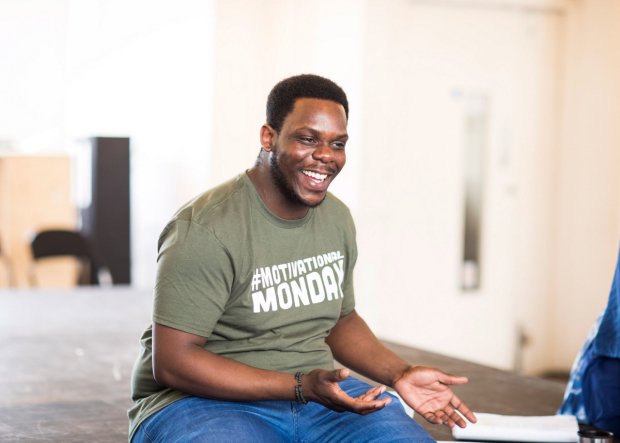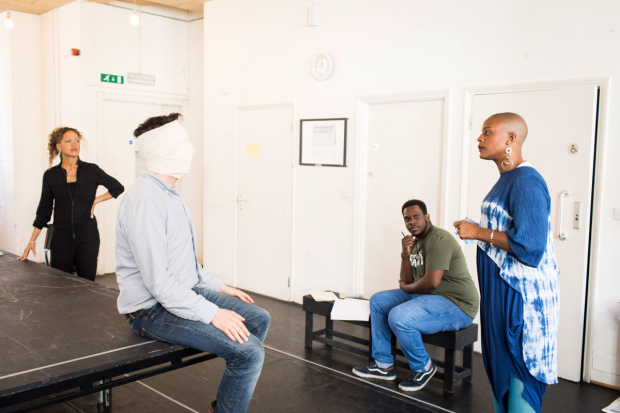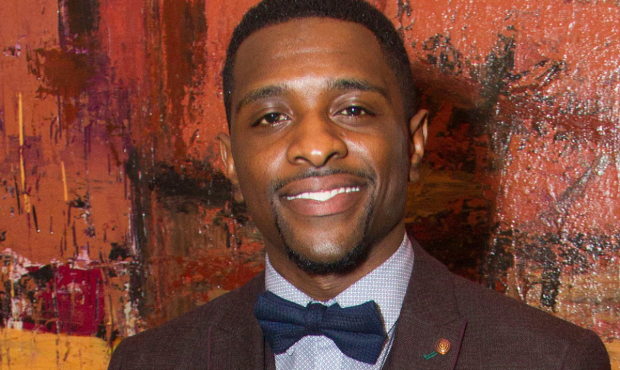Roy Alexander Weise: I was 16 when I realised the power theatre has

© Helen Maybanks
After winning the JMK Award in 2016 and working on a string of hits at the Royal Court, emerging star director Roy Alexander Weise is directing two shows in quick succession this year. The Ugly One, which opens at the Park Theatre next week, and Jekyll and Hyde with the National Youth Theatre in September. His assistant director work has included shows such as the world premiere of Caryl Churchill’s Escaped Alone, Hangmen, Violence and Son and Liberian Girl. He won rave reviews for his JMK production of The Mountaintop, and was named as one of WhatsOnStage’s ten theatre faces to look out for in 2017. Here he talks about how he got into the business and his upcoming projects.
You have swapped the gender one of the lead roles in The Ugly One and changed Jekyll and Hyde from hes to shes. Why’s this?
The character of Scheffler in The Ugly One is a catalyst for a lot of the action in the play, and is generally in a position of power. I remember a recent front page newspaper article where Nicola Sturgeon and Theresa May’s legs were compared and I just felt it was so embarrassing. We are still in a place where two of the most powerful women in the world are put into a kind of legs contest. I thought it would be really fascinating to swap the role in the play, as it looks directly at the complexities of women in power.
And in Jekyll and Hyde?
That was really the adapter Evan Placey who suggested it. He also wanted to place the story still in Victorian times and that really excited me. I am fascinated by the ways history can teach us about today. I feel like we put on a lot of classic stories but they don’t always have political or social relevance. I think we address that with Jekyll and Hyde. These plays – and The Mountaintop too – all have a lot to do with identity and equality, which is something I as an artist and activist wholeheartedly embrace.
The lead role in The Ugly One gets surgery in order to become more successful. How does that fit in with our current perception of body image – it’s mostly women who are the focus…
I think it’s a really fascinating premise. When you come across a man willing to change his face it is almost more shocking these days. Obviously as men we have our own insecurities about the way we look. But I think it’s really interesting exploring the idea of a man being in a position that is traditionally perceived to be that of a woman’s.
Have you been a fan of The Ugly One for a while?
The first time I applied for the JMK Award, I applied with this play and I won the runner up prize. When I first read it I laughed out loud, it is so hilarious and really political. It speaks about beauty, but also about identity and ambition: things that underpin our entire existence.

© Helen Maybanks
You won the JMK Award in 2016, what was it like to win something like that?
It has been overwhelming. It has meant that sustaining a career in the theatre actually feels possible. I still feel worried, of course, if there’s a gap in the schedule, but that’s natural. But to join a group of directors who are smashing it in the industry feels extraordinary. But also one of the biggest obstacles for me is finance. I come from a working class, immigrant family and we didn’t go to the theatre as children. So explaining what I do do my family has been really difficult. But to say I have won this award, and tell them that another person who won it directed The Bodyguard in the West End – that’s something they can hold onto.
You’ve worked a lot on shows at the Royal Court, is it vital to work as an assistant director as much as possible in order to become a director?
Yes, but I do think so much of being a director is about taste and developing your own instincts. But in terms of the craft of directing, knowing how to work with directors and managing a design team, I have absolutely learned and honed my skills at the Court. Working with people like Lucy Morrison, James MacDonald, Matthew Dunster, Hamish Pirie, that experience was essential in getting me to where I am now.
Escaped Alone must have been amazing to work on…
Four extraordinary actresses, Caryl Churchill, an amazing design team, James MacDonald. I was just in awe of James' ease. He has such a can-do attitude. It never felt stressed at any point even though it was a very difficult production to get right. James was calm and collected and kind. Often we are taught directors need to be harsh and authoritative, but there is something about working on a show where people completely trust the director.
You say you didn’t go to the theatre as a kid, when did you start?
My first trip was after school and walking home and I needed to pee so I popped into a building that was open, which happened to be the Ovalhouse. They invited me to join the youth theatre. I was really into music and so played a load of instruments and then when I was 16 I was asked to be in a play – Chat Room, by Enda Walsh. That was the first play I had done.
What made you want to continue with theatre?
Like a lot of teenagers, and for various reasons, I was going through a bit of a rough time. The play is about a character who wants to commit suicide and while I wasn’t anywhere near that place, I could definitely empathise with the intense sorrow he had been feeling. To go on that journey each night for two weeks was a kind of healing process. I could also see how audiences felt a sense of fulfilment towards it and I recognised how important stories are for us. I realised at 16 years old that theatre has a power. It was one of the most electrifying things ever.
The Ugly One runs at the Park Theatre from 8 to 24 June with previews from now. Jekyll and Hyde runs at the Ambassadors Theatre from 26 September to 8 December.











